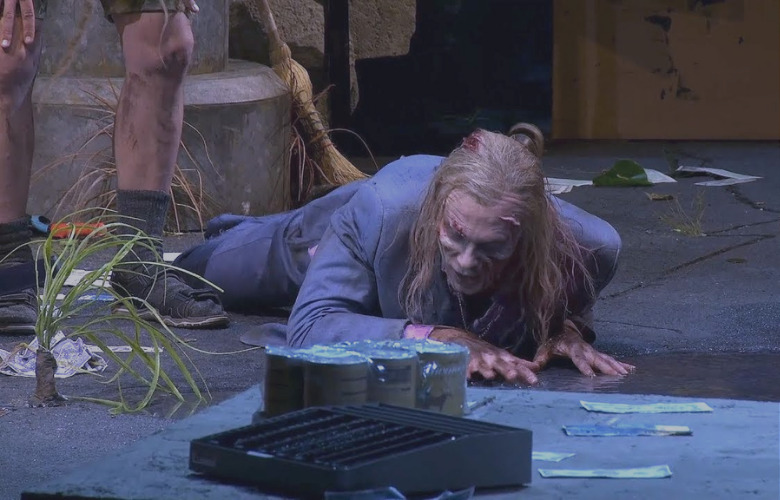
The End of the World as We Know It is delightful, funny, and philosophical all at once. At first a popular play at Theatre Basel, this has now also been adapted by director Joerg Pohl and the Theatre Basel ensemble to form a mini-series in seven parts.
The series was produced after the original production could only be performed three times in the theatre, due to the Covid19 pandemic.
Theme of the play as well as the series, as we can guess from the title, is the end of the world.
Shortly before or long after the end, a handful of survivors of our civilization get together for a post-apocalyptic symposium.
A humanist prepper – the last of the species ‘old white man.’ A cyborg with downloaded emotions. A zombie who used to be an accountant. And the last three specimens of the indestructible species: cockroach, Matsutake mushroom, and tardigrade.
Together, they decide against a war between themselves. Instead, they relax as best as they can in the circumstances. And sit down in a circle to ask themselves: How do we want to live?
Through their discussions, they begin to form a codex of apocalyptic honor “There isn’t enough to last forever, but there is enough for all.”
We, the accidental community of common happenstance, the last six survivors of this planet, pledge to the following codex:
The remaining supermarket supplies are our material base of existence. They are finite. But until we reach the end of them, this applies: There is enough for everyone. Not enough to last forever, but enough for all.
Our non-material base of existence is the community.
We face each other as equal beneficiaries of this community. And we all hold the same status on the food chain.
We will not be natural enemies. And we will not devour each other.
Lack of alternatives is not an argument to break any of these rules.
We want to always use the available room for maneuvering to enlarge the scope of action for everyone in the group. We will never use anything to undermine each other.
All our doing, granting, seeking, and striving shall always be led by the question: How do we empower whom for what?
Even if we can never live up to all these aspirations, we still want to be led by them until the very end.
Our resources are finite. Our scope of action diminishes daily. However, our expectations towards ourselves and the group shall grow no matter what. Even if all hope vanishes on the horizon.
Clearly, The End of the World as We Know It has been inspired by recent worldwide events.
Yet, there is also a philosophical base here. These are questions which should always be asked by all of us. Aspirations which should be held by all of us in the best as well as in the worst of times.
Wonderful about this specific production is that it is in no way schoolmasterly and lecturing towards the audience.
Rather, the six protagonists exhibit a certain lightness of being. One cannot help but chuckle at the playful costume of each character as well as at the humorous wit of all six survivors.
When the apocalypse comes, we can only hope to be stranded somewhere with folks as delightful and compassionate as these.
Production trailer of ‘The End of the World As We Know It’
Storytelling Can Change Lives – Musings of a Transgender Man
Msoke – The First Transgender Musician on the Dancehall Agenda


Liam Klenk was born in Central Europe and has since lived on four continents. Liam has always been engaged in creative pursuits, ranging from photography and graphic design, to writing short stories and poetry, to working in theatre and shows. In 2016, Liam published his first book and memoir, 'Paralian'.
Read Full Profile© 2021 TheatreArtLife. All rights reserved.

Thank you so much for reading, but you have now reached your free article limit for this month.
Our contributors are currently writing more articles for you to enjoy.
To keep reading, all you have to do is become a subscriber and then you can read unlimited articles anytime.
Your investment will help us continue to ignite connections across the globe in live entertainment and build this community for industry professionals.